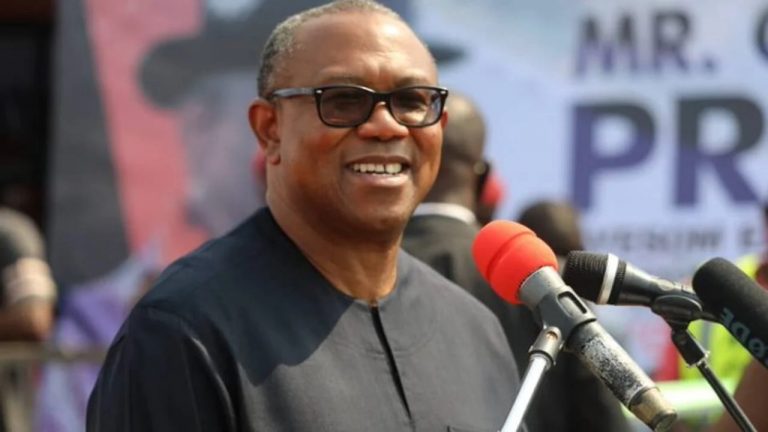
Labour Party’s presidential candidate in the 2023 general election, Peter Obi, has described the N6.93 trillion worth of suspicious projects allegedly smuggled into Nigeria’s 2025 national budget as further proof that the country is being “run like a crime scene,” warning that systemic corruption and impunity have now reached unprecedented levels of boldness.
Obi’s remarks followed a damning exposé by civic-tech organization BudgIT, which revealed that over 11,000 projects—many of them vague, duplicated, or linked to questionable entities—were inserted into the budget by members of the National Assembly. The group described the revelations as part of a “deeply entrenched culture of exploitation and abuse” within the federal legislature.
BudgIT’s findings triggered a storm of public outcry, with analysts and civil society groups calling for an immediate investigation into what is now being described as one of the most bloated and compromised national budgets in recent memory.
Register for Tekedia Mini-MBA edition 19 (Feb 9 – May 2, 2026).
Register for Tekedia AI in Business Masterclass.
Join Tekedia Capital Syndicate and co-invest in great global startups.
Register for Tekedia AI Lab.
Troubling Silence from the Presidency
However, the presidency has maintained a conspicuous silence—one that critics and observers say points to a dubious alliance between the executive and the legislature.
Over 72 hours since BudgIT’s report surfaced, neither the President, the Budget Office, nor the Federal Ministry of Finance has said a word—raising questions about the administration’s commitment to transparency.
Many analysts believe the silence may not be accidental. Instead, they suggest it reflects a growing pattern of collusion between the executive and legislative branches of government.
Several civil society actors have pointed to what they describe as a quid pro quo arrangement—where the National Assembly allows the executive wide latitude in fiscal discretion in exchange for the freedom to inject massive, often opaque, constituency projects into the national budget.
“The insertion of over 11,000 projects worth N6.93 trillion into the 2025 budget by the National Assembly is not just alarming, it is an assault on fiscal responsibility. This trend, increasingly normalized, undermines the purpose of national budgeting, distorts development priorities, and redirects scarce resources into the hands of political elites, Gabriel Okeowo, BudgIT’s Country Director, said, stressing the urgent need to restore integrity to Nigeria’s budgeting process,
Obi: “Nigeria must cease to function as a crime scene”
In a statement issued on Tuesday, Obi said the revelations confirm his long-standing view that corruption is not only endemic but structurally embedded in how Nigeria is governed.
“Nigeria remains a relentless scene of corruption. I have consistently maintained that for this country to make progress, Nigeria must cease to function as a crime scene and be repositioned for genuine development,” Obi said.
“These findings are deeply troubling and confirm my long-held position. This entrenched corruption—persistent and deeply rooted—must be nipped in the bud if there is to be any meaningful turnaround.”
The former Anambra governor noted that while BudgIT uncovered N6.93 trillion in suspicious insertions, the actual amount misappropriated may be significantly higher.
“We must urgently and aggressively combat corruption, misappropriation, and fiscal recklessness in order to manage our resources effectively and efficiently, and invest in critical areas of development: health, education, and lifting our people out of poverty,” he said.
Obi linked Nigeria’s deteriorating public education and healthcare systems to what he called the “brazen impunity” of political leaders. He warned that the same pattern of fiscal irresponsibility is why Nigeria is failing to improve agricultural productivity, create jobs through MSME support, and enhance food security.
“This brazen impunity by our leaders is precisely why the country cannot invest adequately in education—hence the existence of nearly 20 million out-of-school children,” he stated. “It is also why we cannot support MSMEs, fix our hospitals, or tackle food insecurity and rising poverty.”
Lawmakers under scrutiny
At the center of the controversy are Senate President Godswill Akpabio and House Speaker Tajudeen Abbas—both of the ruling All Progressives Congress (APC)—who head the two chambers of the National Assembly. BudgIT’s report suggests that under their leadership, the legislative arm of government has continued a pattern of inflating the budget with non-essential or non-existent projects in exchange for political and financial leverage.
One example cited in the report is the inclusion of projects with little or no description, others with overlapping scopes, and some assigned to agencies without mandates to implement such work. BudgIT also flagged projects assigned to private companies and NGOs without procurement scrutiny or proper oversight.
A growing number of Nigerians and civil society groups are now calling for an independent investigation into both the National Assembly’s role and the Presidency’s complicity. Many have demanded that the Federal Government publish a full breakdown of all budget line items and their executing agencies.
As the silence from the presidency persists, Obi is urging Nigerians to remain vigilant and to demand that public resources be protected from elite capture.
“We must confront this corruption, misappropriation, and fiscal recklessness with unwavering resolve. Our national resources must be transparently managed and strategically invested in key sectors—health, education, and poverty alleviation—to secure a better future for our people,” Obi said.
“We must turn this nation around.”



